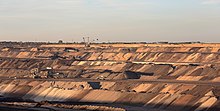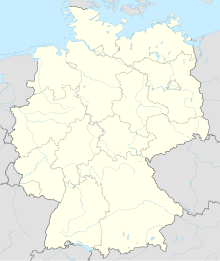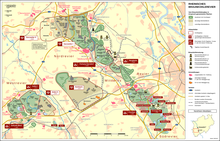Garzweiler surface mine
show This article may be expanded with text translated from the corresponding article in German. (June 2017) Click [show] for important translation instructions. |
 Panoramic view of Tagebau Garzweiler | |
| Location | |
|---|---|
 Garzweiler mine | |
| Country | Germany |
| Coordinates | 51°03′15″N 6°30′35″E / 51.05417°N 6.50972°ECoordinates: 51°03′15″N 6°30′35″E / 51.05417°N 6.50972°E |
| Production | |
| Products | Lignite |
| Owner | |
| Company | RWE |

The Tagebau Garzweiler is a surface mine (German: Tagebau) in the German state of North-Rhine Westphalia. It is operated by RWE and used for mining lignite.[1] The mine currently has a size of 48 km² and got its name from the village of Garzweiler which previously existed at this location. The community was moved to a section of Jüchen with the same name.[2]
The open-pit mine[]

The mine is located west of Grevenbroich and exploitation is progressing towards Erkelenz. Mining was originally limited to the 66.0 km² area Garzweiler I located east of motorway A 44. Mining in the 48.0 km² Garzweiler II sector started in 2006 and it will take until around 2045 to fully exploit both sectors. The lignite is used for power generation at nearby power plants such as Neurath[3] and Niederaußem.
It is not yet known what effect the upcoming plan to phase out all coal-fired power plants in Germany by 2038 will have on the Garzweiler lignite mine system.[4]
Traffic[]
Motorways A 44 and A 61 crossing the planned mine area are also affected. The A 44 was closed in 2005, dismantled in 2006 and traffic rerouted to the widened A 61 and A 46 motorways. In 2017, as the mine expanded to the west, the A 61 was closed with traffic diverted onto a stretch of newly built A 44 to the east of its original route.
See also[]
- Church of St. Lambertus, Immerath
- ("Street of energy")
- Ende Gelände 2015
- Ende Gelände 2019
- Hambach open pit mine
- Commission on Growth, Structural Change and Employment
References[]
- ^ Barry, John (2002). International Encyclopedia of International Politics. Taylor & Francis. p. 216. ISBN 9780415202855. Retrieved 2013-05-26.
- ^ Rolf Sevenich: Garzweiler II. Kersting, Aachen 1996, ISBN 3-928047-12-4.
- ^ Hambachgruppe: Verheizte Heimat – Der Braunkohletagebau und seine Folgen. Aachen 1985, ISBN 3-924007-14-4 (PDF)
- ^ Kirschbaum, Erik (January 26, 2019). "Germany to close all 84 of its coal-fired power plants, will rely primarily on renewable energy". Los Angeles Times. Archived from the original on 2019-01-30. Retrieved January 27, 2019.
Germany, one of the world’s biggest consumers of coal, will shut down all 84 of its coal-fired power plants over the next 19 years to meet its international commitments in the fight against climate change, a government commission said Saturday.
External links[]
| Wikimedia Commons has media related to Tagebau Garzweiler. |
- Coal mines in Germany
- Geography of North Rhine-Westphalia
- RWE
- North Rhine-Westphalia geography stubs

